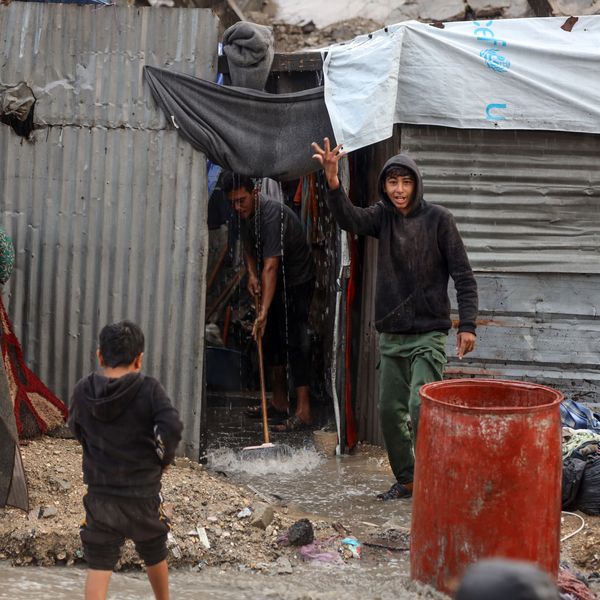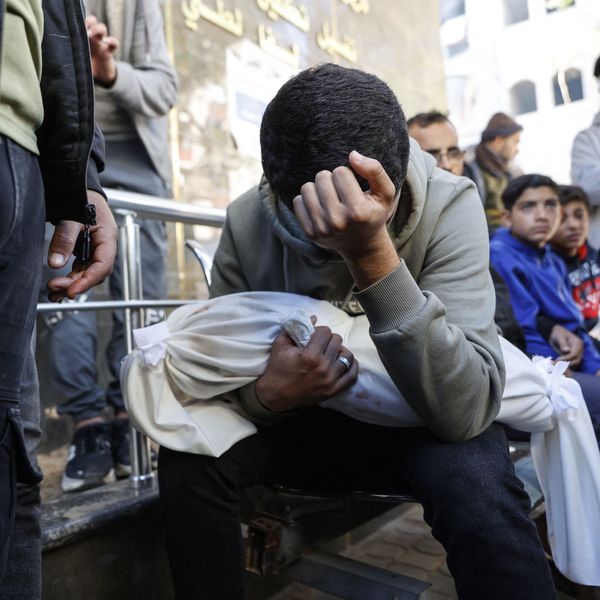Thousands of Palestinians Rally for Release of 5,000 in Israeli Jails, Including 200 Children
As talks between Israel and Palestine falter, thousands of Palestinians demonstrated Thursday on behalf of nearly 5,000 Palestinians imprisoned by Israeli Occupation authorities in 22 Israeli jails, many of them arbitrarily. They include 184 minors and 175 persons being held without any due process.
Many prisoners are subject to "moderate physical pressure," solitary confinement or on bans from being visited by their families. Some 1400 of the Palestinian prisoners are ill.
Saeb Ereikat, a Palestinian politician and negotiator, said, "The plight of the prisoners reflects the plight of the Palestinian people as a whole."
The Israeli military routinely arrests Palestinians for peaceably protesting the theft of their land, water and other resources by illegal Israeli squatters. Often they take away minors, and sometimes they haul off the parents without any regard for what will happen to their small children. The 1949 Geneva Convention on the treatment of people in occupied territories forbids the Occupying power from expropriating locals and from flooding its own population into the Occupied territories.
Some 30 Palestinians are still being held in Israeli prisons since before the Oslo Peace Accords of 1993. As part of those accords, Israel had committed to releasing them, but it never has. Palestinians made it a requirement of their participation in the current round of talks (which began last August) that Israel finally abide by this commitment. Israel did release some 78 of these long-term prisoners, but declined to let the last batch go. As a result, Palestine signed the Geneva Conventions and other UN human rights treaties and instruments, a step preparatory to going to the International Criminal Court over Israel's systematic war crimes in the Occupied Territories. That step in turn caused the talks to collapse. Sec. of State John Kerry blamed Israeli continued squatting activity along with the reneging on the prisoner release for the faltering of negotiations.
Some 4/5s of the Palestinian prisoners in Israeli jails are from the West Bank. Only 9% or so are from the Gaza Strip.
Since 1967, when Israel seized the West Bank and Gaza, some 800,000 Palestinians have circulated through Israeli jails, about 13,000 of them women.
Thursday's protests were also held abroad, including in Argentina, where there is a large Arab immigrant population.
An Urgent Message From Our Co-Founder
Dear Common Dreams reader, The U.S. is on a fast track to authoritarianism like nothing I've ever seen. Meanwhile, corporate news outlets are utterly capitulating to Trump, twisting their coverage to avoid drawing his ire while lining up to stuff cash in his pockets. That's why I believe that Common Dreams is doing the best and most consequential reporting that we've ever done. Our small but mighty team is a progressive reporting powerhouse, covering the news every day that the corporate media never will. Our mission has always been simple: To inform. To inspire. And to ignite change for the common good. Now here's the key piece that I want all our readers to understand: None of this would be possible without your financial support. That's not just some fundraising cliche. It's the absolute and literal truth. We don't accept corporate advertising and never will. We don't have a paywall because we don't think people should be blocked from critical news based on their ability to pay. Everything we do is funded by the donations of readers like you. Will you donate now to help power the nonprofit, independent reporting of Common Dreams? Thank you for being a vital member of our community. Together, we can keep independent journalism alive when it’s needed most. - Craig Brown, Co-founder |
As talks between Israel and Palestine falter, thousands of Palestinians demonstrated Thursday on behalf of nearly 5,000 Palestinians imprisoned by Israeli Occupation authorities in 22 Israeli jails, many of them arbitrarily. They include 184 minors and 175 persons being held without any due process.
Many prisoners are subject to "moderate physical pressure," solitary confinement or on bans from being visited by their families. Some 1400 of the Palestinian prisoners are ill.
Saeb Ereikat, a Palestinian politician and negotiator, said, "The plight of the prisoners reflects the plight of the Palestinian people as a whole."
The Israeli military routinely arrests Palestinians for peaceably protesting the theft of their land, water and other resources by illegal Israeli squatters. Often they take away minors, and sometimes they haul off the parents without any regard for what will happen to their small children. The 1949 Geneva Convention on the treatment of people in occupied territories forbids the Occupying power from expropriating locals and from flooding its own population into the Occupied territories.
Some 30 Palestinians are still being held in Israeli prisons since before the Oslo Peace Accords of 1993. As part of those accords, Israel had committed to releasing them, but it never has. Palestinians made it a requirement of their participation in the current round of talks (which began last August) that Israel finally abide by this commitment. Israel did release some 78 of these long-term prisoners, but declined to let the last batch go. As a result, Palestine signed the Geneva Conventions and other UN human rights treaties and instruments, a step preparatory to going to the International Criminal Court over Israel's systematic war crimes in the Occupied Territories. That step in turn caused the talks to collapse. Sec. of State John Kerry blamed Israeli continued squatting activity along with the reneging on the prisoner release for the faltering of negotiations.
Some 4/5s of the Palestinian prisoners in Israeli jails are from the West Bank. Only 9% or so are from the Gaza Strip.
Since 1967, when Israel seized the West Bank and Gaza, some 800,000 Palestinians have circulated through Israeli jails, about 13,000 of them women.
Thursday's protests were also held abroad, including in Argentina, where there is a large Arab immigrant population.
As talks between Israel and Palestine falter, thousands of Palestinians demonstrated Thursday on behalf of nearly 5,000 Palestinians imprisoned by Israeli Occupation authorities in 22 Israeli jails, many of them arbitrarily. They include 184 minors and 175 persons being held without any due process.
Many prisoners are subject to "moderate physical pressure," solitary confinement or on bans from being visited by their families. Some 1400 of the Palestinian prisoners are ill.
Saeb Ereikat, a Palestinian politician and negotiator, said, "The plight of the prisoners reflects the plight of the Palestinian people as a whole."
The Israeli military routinely arrests Palestinians for peaceably protesting the theft of their land, water and other resources by illegal Israeli squatters. Often they take away minors, and sometimes they haul off the parents without any regard for what will happen to their small children. The 1949 Geneva Convention on the treatment of people in occupied territories forbids the Occupying power from expropriating locals and from flooding its own population into the Occupied territories.
Some 30 Palestinians are still being held in Israeli prisons since before the Oslo Peace Accords of 1993. As part of those accords, Israel had committed to releasing them, but it never has. Palestinians made it a requirement of their participation in the current round of talks (which began last August) that Israel finally abide by this commitment. Israel did release some 78 of these long-term prisoners, but declined to let the last batch go. As a result, Palestine signed the Geneva Conventions and other UN human rights treaties and instruments, a step preparatory to going to the International Criminal Court over Israel's systematic war crimes in the Occupied Territories. That step in turn caused the talks to collapse. Sec. of State John Kerry blamed Israeli continued squatting activity along with the reneging on the prisoner release for the faltering of negotiations.
Some 4/5s of the Palestinian prisoners in Israeli jails are from the West Bank. Only 9% or so are from the Gaza Strip.
Since 1967, when Israel seized the West Bank and Gaza, some 800,000 Palestinians have circulated through Israeli jails, about 13,000 of them women.
Thursday's protests were also held abroad, including in Argentina, where there is a large Arab immigrant population.

